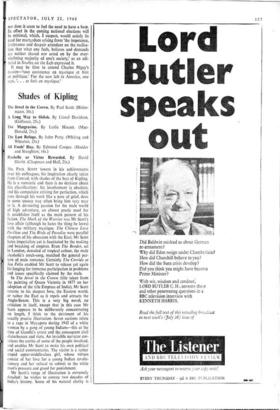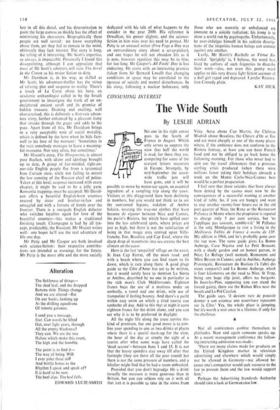Shades of Kipling
The Jewel in the Crown. By Paul Scott. (Heine- mann, 30s.) A Long Way to Shiloh. By Lionel Davidson. (Gollancz, 25s.)
The Margravine. By Leslie Hiscott. (Mac- Donald, 21s.)-
The Last Refuge. By John Petty. (Whiting and Wheaton, 21s.) All Fools' Day. By Edmund Cooper. (Hodder and Stoughton, 16s.) Rochelle or Virtue Rewarded. By David Slavitt. (Chapman and Hall, 21s.) MR. PAUL Scorr towers in his achievements over his colleagues, his inspiration clearly taken from Conrad, with shades of the best of Kipling. He is a romantic and there is no derision about this classification : his involvement is absolute, and his compulsive striving for perfection, which runs through his work like a note of grief, does in some uneasy way often bring him very near to it. A devouring passion for the male world of high adventure, an almost poetic need for it, establishes itself as the main pattern of his fiction. The Mark of the Warrior was Mr Scott's love affair (although he hates the thing he loves) with the military mystique. The Chinese Love Pavilion and The Birds of Paradise were parallel chapters of his obsession with the East; Mr Scott hates imperialists yet is fascinated by the making and breaking of empires. Even The Bender, set in London, denuded of tropical colour, the male alcoholic's torch-song, matched the general pat- tern of male romance. Certainly The Corrida at San Feliu enabled Mr Scott to release yet again his longing for immense participation in problems and issues specifically claimed by the male.
In The Jewel in the Crown (title taken from the painting of Queen Victoria in 1877 on her adoption of the title Empress of India), Mr Scott returns to his deepest love, the Eastern world, or rather the East as it repels and attracts the Anglo-Saxon. This is a very big novel, no criticism in itself, bxcept that in this case Mr Scott appears to be deliberately concentrating on length, I think to the detriment of his usually precise illustration. Seven sections relate to a rape in Mayapore during 1942 of a white woman by a gang of young Indians—this at the time of Gandhi's arrest and the consequent civil disturbances and riots. An invisible narrator cor- relates the stories of some of the people involved, and enables Mr Scott to make his own political and social commentaries. The victim is a rather stupid upper-middle-class girl, whose virtues consist of her love for a young Indian revolu- tionary and her refusal to submit to the white man's pressure and greed for punishment.
Mr Scott's range of illustration is extremely detailed : he wishes to convey two decades of India's history. Some of his natural clarity is
lost in all this detail, and his determination to paint the large canvas so thickly has the effect of minimising his characters. Biographically these people are well served: we know everything about them, yet they fail to remain in the mind, ultimately they lack interest. The story is long, the telling of it interesting; Mr Scott's expertise, as always, is impeccable. Personally I found this disappointing, although I can appreciate that most of Mr Scott's admirers will view The Jewel in the Crown as his major fiction to date.
Mr Davidson is, in his way, as skilled as Mr Scott; his adventure-thriller has the virtue of relating plot and suspense to reality. There's a touch of Le Carre about his hero, an academic archaeologist called in by the Israeli government to investigate the truth of an un- deciphered ancient scroll and its promise of hidden treasure. Dashing and exciting, well characterised, this is definitely a first-rate adven- ture story, further enhanced by a pleasant irony that streaks through the pages and adds to the pace. Apart from all this, Mr Davidson brings in a very acceptable note of social morality, which is defined by the hero when he bids fare- well to his love of the moment : 'Sometimes in the rush somebody manages to leave a meaning- ful memento. Not very often, but sometimes.'
Mr Hiscott's story, The Margravine, is almost pure Buchan, with idiom and ideology brought up to date, A group of fair-minded, right-on- our-side English people flee from a tyrannical Iron Curtain state, while not failing to outwit the low cunning of the Russian chief of police. Taken at this level, suspense increased with every chapter, it might be said to be a jolly yarn. Romantic trappings must be accepted: Mr David- son offers a beautiful English-born countess rescued by sister and brother-in-law and smuggled out with a fortune of bonds over the frontier. There is a renegade English defector who switches loyalties again for love of the beautiful countess—this makes a traditional finishing touch. Champagne is had by all (ex- cept, predictably, the Russian). Mr Hiscott writes well : one hopes he'll use the real adventure of life one day.
Mr Petty and Mr Cooper are both involved with science-fiction : their respective contribu- tions are intended as warnings for the future. Mr Petty is the more able and the more socially
dedicated with his tale of what happens to the outsider in the year 2000. His reference is Orwellian, his power slighter, and the science- fiction in him wins over his need to protest. Mr Petty is an unusual writer (Five Fags a Day was an extraordinary story about a scrap-picker), and one hopes he will not abandon life as it is now, however repulsive this may be to him, for too long. Mr Cooper's All Fools' Day is less endearing. He starts with an interesting premise (taken from Sir Bernard Lovell) that changing conditions in space may be correlated to the increase of suicide and mental disturbances. In his story, following a nuclear holocaust, only those who are neurotic or unbalanced are immune to a suicide radiation; his irony is to show a world run by psychopaths. Unfortunately, he over-indulges himself in his sadistic descrip- tions of the iniquities human beings can commit against one another.
Lastly, Mr Slavitt's Rochelle or Virtue Re- warded. 'Sprightly' is, I believe, the word best liked by authors of such fripperies to describe their work—alas, not even this punky word applies to this very dreary light fiction account of a dull girl raped and depraved. I prefer Restora- tion Comedy plain.
KAY DICK







































 Previous page
Previous page